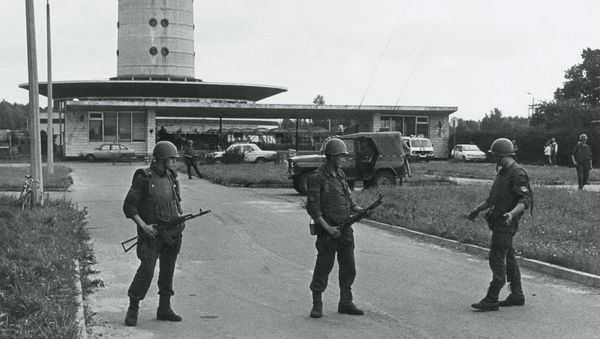Eye For Film >> Movies >> August 1991 (2005) Film Review
August 1991
Reviewed by: Jennie Kermode

August 1991 may not have been particularly memorable for people in most of the world, but it was a crucial moment in Estonia's history, when a coup at the Kremlin led to uncertainty right across the former Soviet empire and tanks rolled into Tallinn to threaten the independence of the fledgling state. The task of dramatising these events fell to Ilmar Raag, probably Estonia's most popular film director and then employed by its television station, which itself played a critical role in the events of that month. Raag might seem a strange choice given that he was admittedly unaware of what was going on at the time, but in a way that made him perfect for the job, because he was able to approach the business of untangling people's memories of the events without adding his own personal bias to the mix.
As a record of events as they took place, August 1991 is not especially remarkable, though it is of great emotional importance to many Estonians. Raag himself admits that, with more time and resources, he could have made a better film. The low budget here shows - the lighting is poor and the film has aged badly, rushed acting tends toward the melodramatic, and there's an intrusive pop music soundtrack (apparently of some national importance). Despite this, however, and despite the lack of strong individual characters to identify with (it's very much an ensemble piece), August 1991 is surprisingly affecting.
In a way, its cheapness works in its favour, because it presents a decidedly unglamorous, unremarkable slice of life. Journalists scrape themselves out of bed in messy flats and go to work in a TV studio which looks like it has seen better days. Everybody has bad hair and drives unfashionable cars. They drift in and out of petty arguments and manage to doze through radio announcements of enormous political import. In short, they seem like the sort of people one might see around every day in one's own life, and it is bizarre in the extreme to see them faced with such a dramatic situation, especially when we know it really happened. Raag has succeeded in capturing the surreal sense of a world where the rules have suddenly been thrown out. These people have had no time to prepare themselves for heroism. They don't know what to do.
What does it take for ordinary people to be heroes? Is it about some kind of remarkable individual virtue, or is it about not wanting to back down in front of friends and colleagues who are themselves preparing to fight for what you all hold dear? It's one thing to step forward in protest, another to stay there once the soldiers arrive. The human element in this real-life drama is easy to identify with, making it a much more compelling story than many more lavish productions.
Reviewed on: 14 Mar 2009















